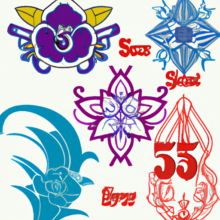Are Tattoos An Addiction?
Are Tattoos An Addiction: Exploring the Controversy
Tattoos have been a form of self-expression for centuries, with evidence of their existence dating back to ancient civilizations. In recent years, tattoos have become increasingly popular, with more and more people choosing to permanently ink their bodies with meaningful designs. However, with this rise in popularity, a controversial question has emerged: are tattoos an addiction?
The concept of addiction is often associated with substances such as drugs and alcohol, but it can also refer to behaviors or activities that a person feels compelled to engage in. In the case of tattoos, some argue that the desire to get more and more tattoos can be classified as an addiction. But is this truly the case, or is it simply a matter of personal preference and self-expression?
One argument for tattoos being an addiction is the fact that many people who get tattoos often feel the need to get more. This can be seen as a form of compulsive behavior, similar to that of a person addicted to gambling or shopping. The thrill of getting a new tattoo and the rush of endorphins that come with it can lead to a desire for more, creating a cycle of constantly seeking out new tattoos.
Additionally, some individuals may use tattoos as a coping mechanism for underlying emotional issues. This can be seen as a form of self-medication, similar to how someone may turn to drugs or alcohol to cope with their problems. In this sense, tattoos can be seen as an addiction because they provide a temporary escape from reality.
On the other hand, many argue that tattoos are not an addiction, but rather a form of self-expression and art. Getting a tattoo is a personal choice and can hold deep meaning for the individual. It is a way for people to express their identity, beliefs, and values. In this sense, tattoos can be seen as a positive outlet for self-expression, rather than a harmful addiction.
Furthermore, the idea of tattoos being an addiction is often stigmatized and can be seen as a way to shame those who have tattoos. This stigma is often rooted in societal norms and expectations, with tattoos being seen as rebellious or unprofessional. This can lead to the misconception that those with tattoos are somehow “addicted” to them, rather than simply enjoying the art form.
It is also important to note that not all individuals who have tattoos feel the need to constantly get more. For many, getting a tattoo is a one-time experience, and they may not feel the desire to get more. This further supports the argument that tattoos are not an addiction, but rather a personal choice.
So, are tattoos an addiction? The answer is not a simple yes or no. While some individuals may exhibit addictive behaviors when it comes to getting tattoos, it is not fair to label all tattoo enthusiasts as addicts. It is important to recognize that everyone’s relationship with tattoos is unique and should not be judged or stigmatized.
In conclusion, the debate over whether tattoos are an addiction is a complex one. While some may argue that the desire for more tattoos can be classified as an addiction, others see it as a form of self-expression and art. It is important to recognize that everyone’s relationship with tattoos is different and should not be judged or labeled. Ultimately, the decision to get a tattoo should be a personal one, free from societal expectations and stigmas. So, whether you have one tattoo or a full sleeve, embrace your body art and let it be a reflection of your unique self.



